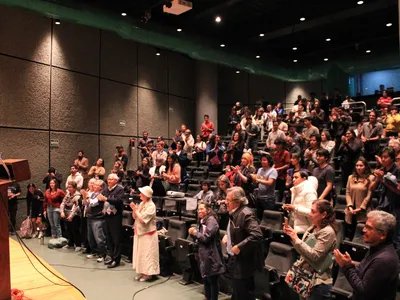Symposium results and derivations

After receiving over 1,500 in person attendees and more than 6,000 on-line participants, the Symposium on the Philosophy of Computing was a resounding success.
University City. Mexico City. December 8, 2023. With a concert by flutist Horacio Franco featuring the music of Johann Sebastian Bach, the 1st Symposium on the Philosophy of Computing concluded this Friday. The symposium was held from December 4 to 8 at the School of Sciences of UNAM (FC-UNAM), attracting nearly 400 daily in-person attendees across 30 lectures throughout the week, and around 1,700 online participants from Mexico, the United States, Europe, and Latin America.
This event brought together a diverse community of philosophers, computer scientists, and other professionals, as well as interested individuals and the general public, to explore the philosophical aspects and modern dilemmas of computing.
Enrique Francisco Soto Astorga, adjunct professor in the Department of Mathematics at FC and president of the Symposium Organizing Committee, stated that the event had multiple origins. The first was the Philosophy of Computing course he has been teaching since last year, which included a series of guest lectures aimed at broadening the students’ education in areas beyond their typical studies. The intention was to consolidate these talks into a colloquium week; however, the addition of more lectures gradually expanded it into a larger event.
“The second driving force is necessity, given that we are increasingly immersed in fully technological and technologized dynamics. This is a call to action that we as individuals and as a university are late to address. For me, this event naturally emerged from the interest of my students and the general community.”
Thus, the symposium gathered the entire university community working on related topics to foster engagement and dialogue about philosophical issues in computing and its implications: artificial intelligence, data ethics, biocomputing, unconventional computing, computational theory, and cognitive science.
“Another objective was to create an informational space for Mexican society with these same contents. This event is designed for both academic and non-academic individuals, those involved in the industry, and others whose work is increasingly intersected by technology. An auxiliary goal is to establish a niche so that the university and academics working in this field have a space to continue discussing these topics in the future.”
Regarding the program, there were 30 lectures throughout the week, with more than four thousand registrations on the website. Daily attendance at the Carlos Graef Auditorium of FC ranged from 360 to 380 people, with over 1,700 attendees via Zoom and associated platforms. Participants connected from Europe, the United States, Cuba, and Latin America.
The event concluded with Horacio Franco performing eight pieces by Bach on the flute. The symposium also included cultural activities, a painting exhibition, networking sessions, a cultural showcase by the FC drawing club, and a colloquium where students from the Philosophy of Computing course presented their semester projects. The organizers announced that in two years, the symposium will be expanded into a full-fledged conference.
Karla Ramírez Pulido, adjunct professor of Computer Science and co-organizer of the event, noted the importance of fostering dialogue between the two major fields of philosophy and computer science to identify converging points and generate discussion.
“We aimed to address cutting-edge topics that interest us, exploring the future of computing and what we can contribute to current global developments from a philosophical perspective intertwined with technology, as these areas permeate our daily lives. Fortunately, the sessions were full, with a very diverse audience, not just people from STEM fields, but from many other areas, which greatly enriched the discussion,” expressed the researcher.
Translated from the original note by Susana Paz.
